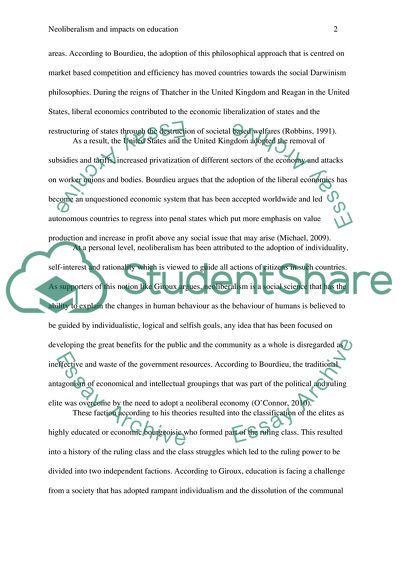Cite this document
(Neoliberalism and Impacts on Education Essay Example | Topics and Well Written Essays - 2750 words, n.d.)
Neoliberalism and Impacts on Education Essay Example | Topics and Well Written Essays - 2750 words. https://studentshare.org/sociology/1824036-compare-pierre-bourdieu-and-henry-giroux-theories-in-relation-to-neoliberalism-and-discuss-their-consequences-for-education
Neoliberalism and Impacts on Education Essay Example | Topics and Well Written Essays - 2750 words. https://studentshare.org/sociology/1824036-compare-pierre-bourdieu-and-henry-giroux-theories-in-relation-to-neoliberalism-and-discuss-their-consequences-for-education
(Neoliberalism and Impacts on Education Essay Example | Topics and Well Written Essays - 2750 Words)
Neoliberalism and Impacts on Education Essay Example | Topics and Well Written Essays - 2750 Words. https://studentshare.org/sociology/1824036-compare-pierre-bourdieu-and-henry-giroux-theories-in-relation-to-neoliberalism-and-discuss-their-consequences-for-education.
Neoliberalism and Impacts on Education Essay Example | Topics and Well Written Essays - 2750 Words. https://studentshare.org/sociology/1824036-compare-pierre-bourdieu-and-henry-giroux-theories-in-relation-to-neoliberalism-and-discuss-their-consequences-for-education.
“Neoliberalism and Impacts on Education Essay Example | Topics and Well Written Essays - 2750 Words”. https://studentshare.org/sociology/1824036-compare-pierre-bourdieu-and-henry-giroux-theories-in-relation-to-neoliberalism-and-discuss-their-consequences-for-education.


